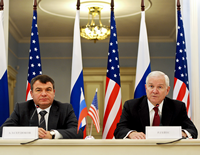Robert Gates has just completed his first and perhaps his last trip to Russia as secretary of defense under President Barack Obama. Although the two-day visit produced little of substance, some of Gates' public reflections help us understand how much the Russian-U.S. military relationship has improved during the last few years.
As expected, much of the media coverage concerned Russia's response to the military intervention in Libya led by the U.S., Britain and France. The apparent split between Prime Minister Vladimir Putin, who denounced the intervention as a "crusade," and President Dmitry Medvedev, who mildly rebuked his erstwhile boss, attracted the most attention. Still, the rhetorical flare-up should not be exaggerated, since neither leader has taken any concrete steps to either actively oppose or support the intervention. In his meeting with Gates, Medvedev did offer to mediate the conflict, but nothing came of that initiative.
In this respect, the Russian government is following the same script as that of China, India, some European governments and many Arab leaders, which consists of attacking the United States and its coalition partners for allegedly inflicting too many casualties. At the same time, they tacitly endorse the operation either through a genuine desire to prevent a civilian massacre, a dislike of Gadhafi's regime, a reluctance to risk damaging relations with Western governments or some combination of the three.

